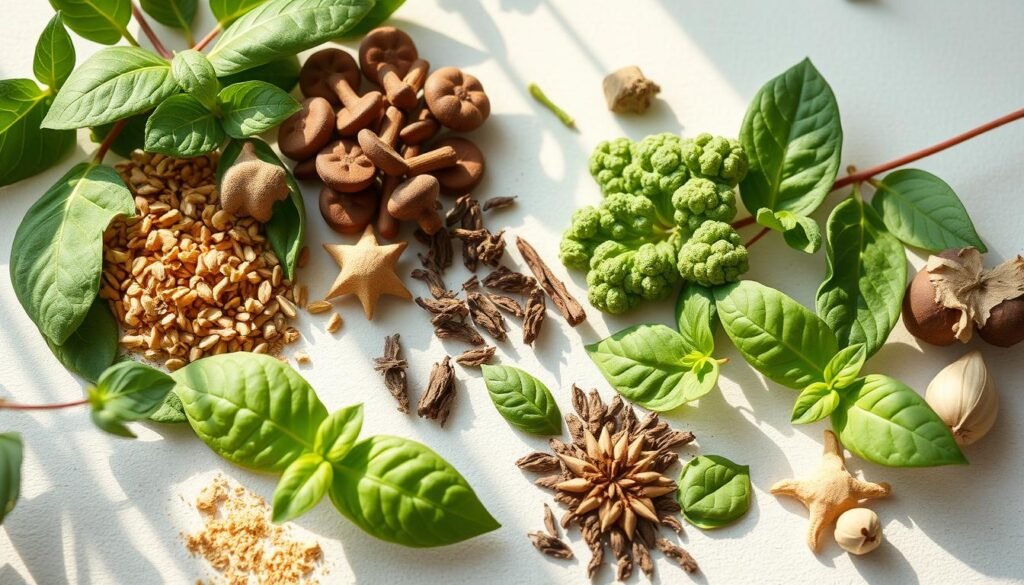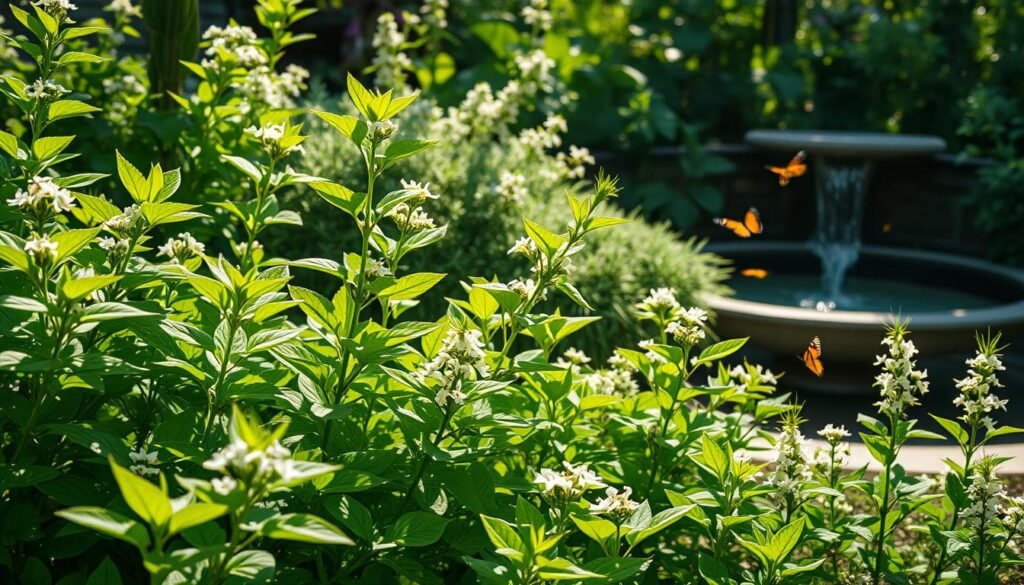Did you know over 18% of people in the United States are affected by anxiety disorders each year? This important fact points to a growing need for effective treatments. As people search for relief from anxiety, many choose herbal remedies for anxiety as a natural option instead of traditional medicines. Up to 30% of adults will face an anxiety disorder at some time in their life. So, it’s crucial to know about these natural treatments.
This guide explores various natural treatments for anxiety. It highlights popular herbs like chamomile, lavender, and valerian root. A look at over 100 studies found that 45% of them had positive results from herbal supplements. This suggests they could be effective in easing anxiety symptoms. These calming herbal choices also tend to have fewer negative side effects than prescription drugs. For more details, visit Mood Care Health for insight on natural supplements for anxiety relief.
In discussing the safety, benefits, and how to use these herbal remedies, the article stresses the value of a whole-person approach to manage anxiety. The strong scientific backing shows why many people prefer these natural solutions for their emotional well-being.
Key Takeaways
- Anxiety disorders impact over 18% of Americans annually.
- Natural remedies, such as chamomile and passionflower, show promising results in managing anxiety.
- Studies indicate that 45% of herbal supplement trials report a positive impact on anxiety symptoms.
- Herbal supplements often present fewer side effects compared to traditional medication.
- Consulting a healthcare professional is crucial when considering herbal remedies for anxiety.
Understanding Anxiety Disorders
Every year, over 18% of people in the US deal with anxiety disorders. These can include conditions like generalized anxiety disorder (GAD), panic disorder, and social anxiety. It’s important to recognize the anxiety symptoms that come with these issues because it helps manage mental health.
Anxiety can show up as constant worry, feeling restless, and having a fast heartbeat. These signs can make everyday life hard. Also, anxiety can come from different places, like genes, the environment, or past scary experiences.
There are many ways to treat anxiety. People often choose therapies like cognitive behavioral therapy or medicines known as SSRIs and beta blockers. More people are trying out alternative treatments too. From 1990 to 1997, the use of these non-traditional methods went from 34% to 42%.
Choosing the right treatment means knowing a lot about these disorders. When you understand your options, you’re better at making decisions. This knowledge also helps you face challenges with mental health better.
| Anxiety Disorder | Description | Common Symptoms | Treatment Options |
|---|---|---|---|
| Generalized Anxiety Disorder (GAD) | Chronic, excessive worry about various aspects of life | Restlessness, fatigue, difficulty concentrating | Cognitive Behavioral Therapy, SSRIs |
| Panic Disorder | Recurrent, unexpected panic attacks | Palpitations, sweating, trembling | Psychotherapy, beta blockers |
| Social Anxiety Disorder | Intense fear of social situations | Self-consciousness, fear of judgement | Exposure therapy, medications |
What Are Herbal Remedies for Anxiety?
Herbal remedies are a natural way to manage anxiety. They come from plants and have a long history. They help ease anxiety symptoms.
Definition and Overview of Herbal Remedies
Herbal remedies include products like leaves, roots, and flowers. They have active elements that may help with anxiety. People are increasingly considering them as an alternative to medication.
Importance of Natural Alternatives to Prescription Medications
People often prefer herbal remedies to avoid side effects of medications. Pharmaceuticals can have unwanted effects. Herbs are seen as a more holistic choice.
However, natural doesn’t mean always safe. It’s important to talk to a doctor. This is crucial for older adults and pregnant people to avoid risks.
| Herbal Remedy | Effectiveness for Anxiety | Considerations |
|---|---|---|
| Kava | Linked to liver damage | FDA warnings exist |
| Passion Flower | Small trials indicate potential | Limited conclusive data |
| Valerian | Reported reduction in anxiety | May cause drowsiness |
| Chamomile | Effective for generalized anxiety | Limited data available |
| Lavender | Possible reduction in anxiety | Needs further study |
| Lemon Balm | Indicated for anxiety symptoms | Research ongoing |
Exploring herbal options for anxiety is becoming more popular. As interest grows, getting the right advice is key for safe use.
Common Herbal Remedies for Anxiety
Herbal remedies are now widely acknowledged for helping with anxiety. They offer a natural way to ease symptoms without the side effects common to many drugs. Here, we explore some top herbal choices that bring relief.
Benefits and Usage of Chamomile Tea
Chamomile tea is celebrated for its calming impact. It’s a powerful herbal anxiety relief, easing anxiety symptoms with its gentle effect. A daily dose of 220-1100 milligrams of chamomile extract can significantly lessen generalized anxiety symptoms over time. It not only relaxes immediately but also improves sleep, making it a prime pick for those preferring natural chamomile anxiety treatment methods.
Exploring the Calming Effects of Lavender Oil
Lavender oil is praised for its anxiety relief qualities, especially in aromatherapy. It works with the brain to ease stress and foster calmness. Using it in diffusers or topically brings about the aromatherapy benefits, making it a go-to for anxiety relief.
Valerian Root: A Natural Solution for Anxiety
Valerian root is known for helping with sleep and anxiety. Taking 400-900 milligrams before bed can improve sleep and calm the mind. While it’s popular, research into valerian root uses and its effectiveness is ongoing, especially alongside other herbal supplements for anxiety.
Considering herbal remedies is key for anyone looking at natural anxiety relief. Research into these remedies’ effectiveness offers insights for better anxiety disorder management. Studies show that adding these natural solutions to daily routines can enhance stress management, as discussed in various herbal psychopharmacology studies.
| Herb | Primary Use | Dose Recommendation | Benefits |
|---|---|---|---|
| Chamomile | Tea for anxiety relief | 220-1100 mg daily | Improved sleep quality, reduced anxiety |
| Lavender | Aromatherapy for relaxation | As needed in diffusers or topical | Decrease in anxiety level, enhanced mood |
| Valerian Root | Sleep aid and anxiety reduction | 400-900 mg 2 hours before bedtime | Better sleep latency, reduced anxiety symptoms |
The Role of Adaptogenic Herbs in Stress Relief
With 47% of Americans feeling more stressed since the pandemic, the search for stress relief is on. Adaptogenic herbs are becoming popular for their natural stress and anxiety relief. These herbs have been used for centuries in Asia and India. They help the body handle stress by affecting the hypothalamic-pituitary-adrenal (HPA) axis.
Herbs must meet three criteria to be considered adaptogens. They must be safe, boost the body’s stress resilience, and help maintain stability. Well-known natural adaptogens for anxiety are Ashwagandha and Rhodiola. Ashwagandha is effective against anxiety and depression. Rhodiola is known for easing fatigue and pain.

Adaptogens have a rich history, but research on their benefits in humans is still evolving. Some research indicates these herbs could complement traditional treatments for fatigue and immune support. A 2021 study pointed out important components in adaptogens, like triterpenoid saponins, vitamins, and flavonoids. These may help protect against stress.
However, the FDA doesn’t oversee the quality or purity of herbal supplements. This underlines the importance of being cautious and talking to a doctor before trying adaptogens. Certain adaptogens, such as ginseng and ashwagandha, might not be suitable for everyone. This is especially true for pregnant or nursing individuals, or those on specific medications.
Omega-3 Fatty Acids and Their Impact on Anxiety
Omega-3 fatty acids are found in fish oil and some plants. They are important for mental health, especially in dealing with anxiety. Studies show these fats can improve mood and brain health.
A review of 19 studies with 2,240 people from 11 countries found omega-3 supplements can lower anxiety. People who took omega-3 polyunsaturated fatty acids had better results than those who didn’t. This shows how beneficial omega-3 can be.
The average dose of omega-3 used in studies was about 1,606 mg daily. It worked best for people with certain health issues. With 1 in 5 adults in the U.S. facing anxiety yearly, omega-3s offer a promising supplement.
Taking more than 2,000 mg of omega-3s daily has even stronger effects, especially for clinical anxiety. According to research, high doses help a lot.
Even though omega-3s are helpful, it’s good to be careful. Always talk to a doctor before starting omega-3 supplements. This is very important for those with health issues or fish allergies.
| Study | Participants | Mean Age | Mean Dose (mg/day) | Anxiety Reduction |
|---|---|---|---|---|
| Systematic Review (19 Trials) | 2240 | 43.7 | 1605.7 | Significant |
| Specific Clinical Diagnoses | Varied | N/A | 2000+ | Greater Reduction |
Exploring Passionflower for Anxiety Management
Passionflower, known as Passiflora incarnata, is recognized for its anxiety-reducing benefits. For centuries, it has been used in different cultures to heal wounds, combat insomnia, and ease anxiety. Research suggests that when used with other herbs, passionflower can be quite effective.
Efficacy and Safety of Passionflower
Studies show that passionflower might help manage anxiety. For example, an herbal extract including passionflower reduced generalized anxiety disorder symptoms. A double-blind trial found that patients taking passionflower had much less preoperative anxiety than those on a placebo. This finding underscores its value in passionflower for anxiety relief.
While effective, it’s crucial to ensure the safety of herbal remedies. Passionflower is mostly safe but can cause side effects like drowsiness and dizziness. It’s especially important for pregnant women, breastfeeding mothers, and people on sedative drugs to be cautious. It might interact with blood thinners and some antidepressants, so consulting a healthcare provider is essential before starting.
Passionflower comes in tea, tinctures, capsules, and tablets. You can typically take 500 to 1,000 mg three times daily. This variety allows people to find a format that suits their lifestyle and enjoy its soothing benefits.

How Kava Kava Can Help with Anxiety Symptoms
Kava kava comes from the root of the Piper methysticum plant. It is known for its ability to ease anxiety. Like alcohol, it makes you feel relaxed and calm. Studies have shown that kava can quickly lessen anxiety symptoms, often in just a week.
Research found that kava extract works better than a placebo in reducing anxiety. This supports the idea that kava helps with anxiety. A large review found it particularly helps those with generalized anxiety disorder (GAD). Clinical studies have seen reductions up to -9.9 points on the Hamilton Anxiety Rating Scale (HAM-A). This shows kava could be as effective as some anxiety drugs.
However, we cannot overlook the risks tied to kava kava. In Europe, over 30 cases of liver damage from kava have been reported. This has led to bans in places like Canada and Great Britain. If you have liver problems or take certain drugs, be careful with kava. It can cause liver toxicity, hair loss, and interact with sedatives and alcohol.
Because of these mixed findings, it’s smart to talk to a healthcare provider before using kava kava. Pregnant or breastfeeding people should avoid it. Kava does offer hope for managing anxiety. But, it’s important to use it wisely to steer clear of its risks.
Lemon Balm: A Gentle Herb for Stress Reduction
Lemon balm, known as Melissa officinalis, is great for reducing stress. It has been used since the Middle Ages for relaxation. Recent studies show it helps with anxiety by calming the mind.
When combined with other herbs, lemon balm improves sleep and mental well-being. This makes it a reliable aid for better rest and mood.
Potential Benefits and Minimal Risks
Lemon balm benefits are impressive, including better sleep. In one study, 81% of people slept better thanks to it. Another study found 600 mg of lemon balm increased calmness and alertness.
It also supports brain health, useful for Alzheimer’s patients. Lemon balm comes in many forms like teas, capsules, and oils. Here are some common dosages:
| Form | Dosage |
|---|---|
| Capsules | 300-500 mg |
| Tea | 1.5-4.5 grams |
| Tincture | 60 drops |
Though lemon balm is generally safe, some may get stomach upset. It’s important for those with plant allergies to be cautious. And, those on medications should talk to a doctor before using it.

The Benefits of Ashwagandha as a Stress Reducer
Ashwagandha is an adaptogenic herb known for its stress-reducing powers. It lowers cortisol levels, promoting relaxation and mental clarity. A 2021 review involving 491 adults showed ashwagandha’s significant effects on stress and anxiety.
People taking ashwagandha reported better well-being. Doses from 240 to 1,250 mg a day improved anxiety and sleep. Studies up to 90 days found benefits like lower cortisol and increased focus and energy.
Ashwagandha use improved psychological health in many users. Taking two capsules daily for a month improved calmness, clarity, and sleep. Small doses between 250 to 600 mg helped those with insomnia, showcasing ashwagandha’s strength as an adaptogen.
Ashwagandha is generally safe with few side effects like stomach upset and drowsiness. However, those pregnant or nursing should be cautious. No severe issues were noted within three months of use.
| Dosage Range | Reported Benefits | Duration of Usage |
|---|---|---|
| 240 – 1,250 mg/day | Lower stress levels, improved sleep quality | 6 – 8 weeks |
| 500 – 600 mg/day | Increased psychological well-being, less anxiety | 8 – 12 weeks |
| 600 mg/day or higher | Faster sleep onset, longer sleep duration | 8 weeks |
Ashwagandha excels in managing stress and enhancing well-being. It’s a top natural choice for those facing anxiety and stress in life.
Conclusion
This guide provides insights into using herbs for anxiety relief. Around 6.8 million Americans deal with generalized anxiety disorder. Plus, 55 million people face both anxiety and depression. Herbs like passionflower, kava, and hops show promise, backed by studies proving their effectiveness.
Research on 21 trials shows that 71% had positive outcomes from herbal remedies. Though these options look hopeful, safety is crucial. Anyone considering herbal treatments should talk to a health professional first. This is especially true for those on other medications. Understanding how each person reacts differently is key to managing anxiety well.
Herbal remedies could be a good choice for treating anxiety, but more studies are needed. These natural options might have fewer side effects than standard drugs. For those seeking a gentler way to handle anxiety, herbs may offer a better path.